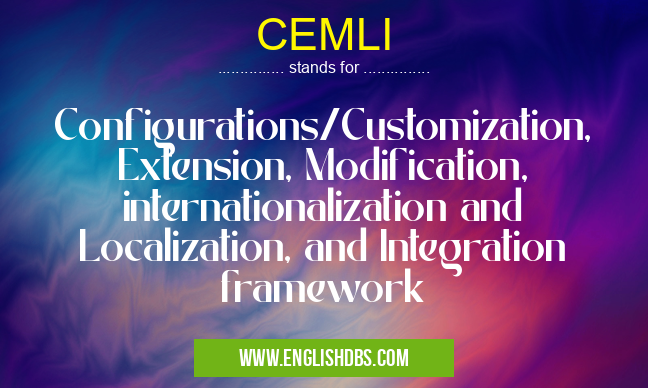What does CEMLI mean in SOFTWARE
CEMLI is an acronym standing for Configurations, Extensions, Modifications, Internationalization and Localization, and Integration. This acronym can be used to refer to a specific framework designed to help developers customize their software applications to meet the needs of their users in different markets and regions. This framework provides developers with tools to adapt the product both functionally and linguistically to enable global reach.

CEMLI meaning in Software in Computing
CEMLI mostly used in an acronym Software in Category Computing that means Configurations/Customization, Extension, Modification, internationalization and Localization, and Integration framework
Shorthand: CEMLI,
Full Form: Configurations/Customization, Extension, Modification, internationalization and Localization, and Integration framework
For more information of "Configurations/Customization, Extension, Modification, internationalization and Localization, and Integration framework", see the section below.
Configurations
Configurations refer to the ways in which system settings are configured for a particular user or group of users. This includes features such as language selection, display settings, security settings, and other configuration options that can be tailored to different users or user groups. The CEMLI framework allows developers to create custom configurations for each user or group of users.
Extensions
Extensions are additional sets of code that extend the functionality of the existing application. These often provide new features or enhance existing ones. This helps developers customize their applications within the CEMLI framework by adding new capabilities without having to write all new code from scratch; thus saving time and reducing costs.
Modifications
Modifications are additions or changes made to existing code in order to fix bugs or add new features. In many cases these modifications come in the form of patches applied directly onto the application’s source code; however, more complex modifications can also be made within the CEMLI framework itself via extension points (these are special places where custom code can be injected).
Internationalization & Localization
Internationalization (often abbreviated as i18n) refers to making an application globally-friendly by supporting multiple languages and cultures, whereas localization (abbreviated as L10n) deals with creating culturally-specific content ordering and layout based on regional preferences. The CEMLI framework provides tools enabling developers to quickly internationalize & localize their application for any given market they wish it distributed in - allowing them maximum reach potential while still maintaining a high level of product customizability at each target region.
Integration
Integration refers to how the application interacts with other applications or systems within an organization’s tech stack; this includes things like APIs, connectors between databases/systems, webhooks used for communication purposes etc… The CEMLI framework provides out-of-the box integration support so that developers don’t have to re-invent the wheel every time they need an integration point into another system; rather than having coded their own solutions (which takes precedence over any native/pre-built solution).
Essential Questions and Answers on Configurations/Customization, Extension, Modification, internationalization and Localization, and Integration framework in "COMPUTING»SOFTWARE"
What is CEMLI?
CEMLI stands for customizations, extensions, modifications, internationalization and localization, and integration framework. It's a set of tools that enables software developers to quickly create customized versions of existing applications. It also helps them extend the functionality of existing applications by adding new features and functionalities to them. Additionally, it allows for easy localization and internationalization in order to make the software available in multiple languages and regions.
How does CEMLI work?
CEMLI is essentially a collection of development tools that are designed to help developers quickly modify existing software applications so that they meet their specific requirements. It includes components such as templates, libraries of functions, configuration files, code generators and wizards. By using these tools, developers can easily modify existing software applications to fit their exact needs without having to write or tweak code from scratch each time.
What benefits do I get from using CEMLI?
With CEMLI you can save time and money by allowing developers to quickly customize existing software applications with minimal effort. It can also help ensure consistency across different projects as all customization is done using standardized library functions. Additionally, the ability to easily localize and internationalize applications ensures wider reach for your product on a global scale.
What sort of modifications can I make with CEMLI?
The range of modification you can make with CEMLI largely depends on the type of application that you are working with but typically speaking you should be able to customize almost any aspect including user interfaces (UI), application logic (business rules) or database structures (data models). Additionally its wide range of components allow developers flexibility when creating complex integrations between multiple systems.
Can anyone use CEMLI?
To use this framework effectively it requires some knowledge in coding particular languages such as Java or.NET plus knowledge about how best manipulate data structures in databases such as MySQL or Oracle. Thus while ordinary users may not benefit much from it, experienced software engineers would find this tool useful for developing customized solutions rapidly.
Final Words:
The CEMLI framework is a powerful toolkit for software development teams looking for ways to improve & extend their product offerings across different geographies & target markets without sacrificing customization options or spending too much time/money engineering solutions from scratch.Thanks to its Configurations, Extensions, Modifications, Internationalization & Localization abilities as well as integrated components –developers can quickly and efficiently tailor their applications around global customer needs.
